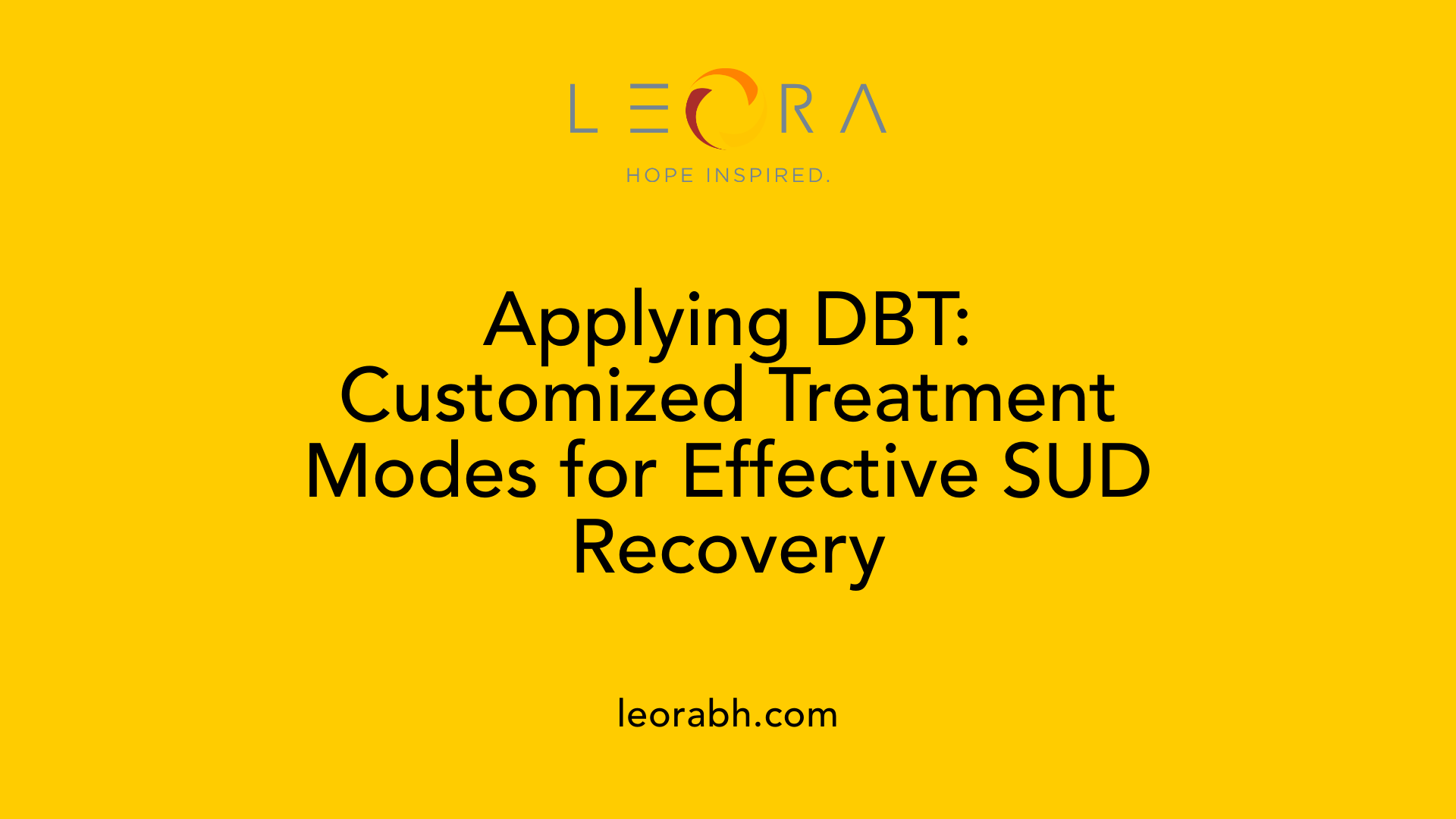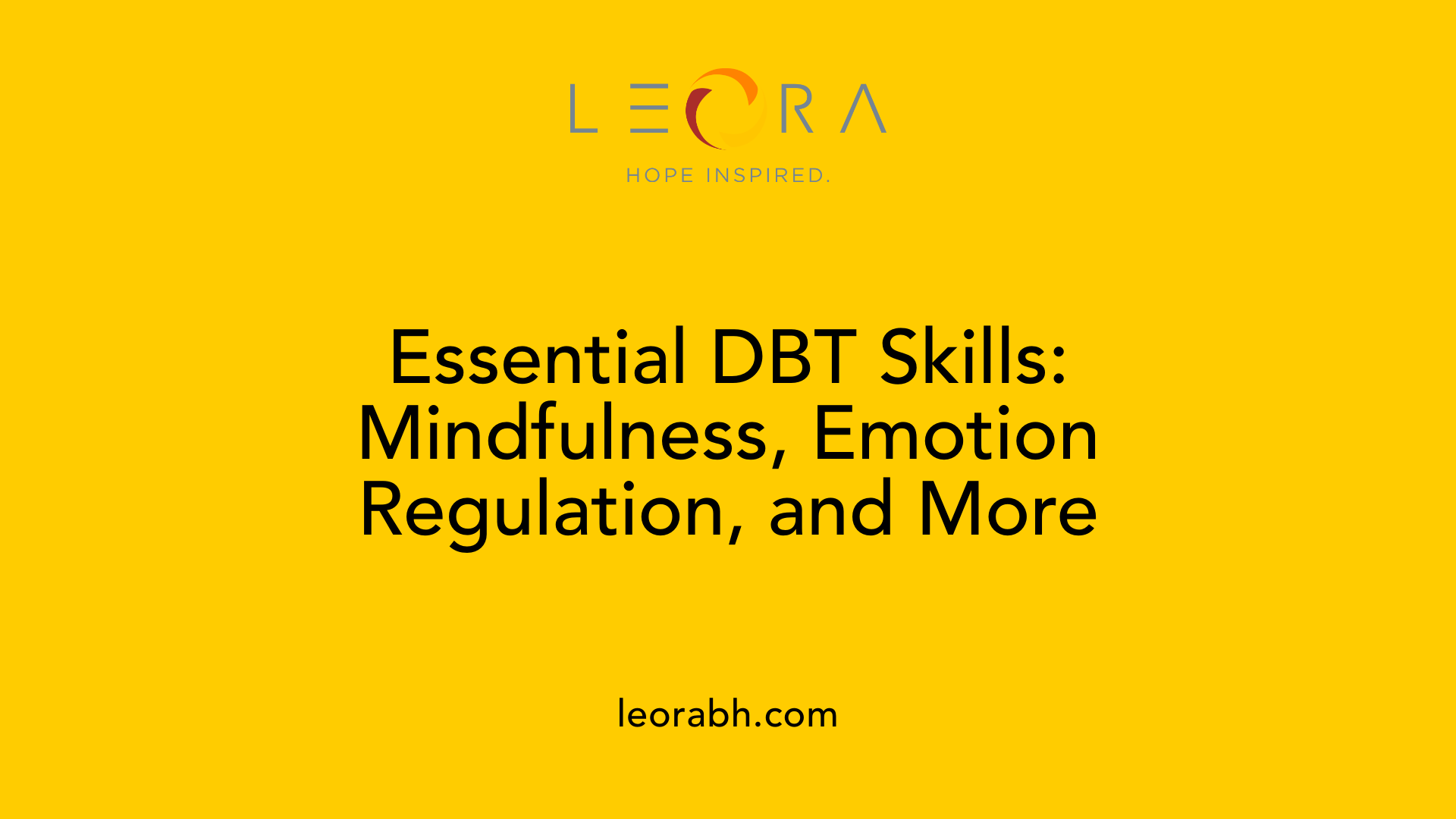How Dialectical Behavior Therapy Is Used in SUD Treatment
Transforming Addiction Recovery with Evidence-Based Strategies
Understanding the Role of DBT in SUD Treatment
Dialectical Behavior Therapy (DBT), initially developed for borderline personality disorder, has evolved into a crucial treatment component for Substance Use Disorders (SUD). Its comprehensive approach combines cognitive-behavioral techniques with mindfulness and acceptance strategies, addressing the emotional and behavioral complexities often accompanying addiction. This article explores how DBT is applied in treating SUD, examining the principles, skills, evidence, and customization options that make it a stand-out modality in addiction recovery.
Core Principles and Components of DBT in SUD

What are the principles and components of DBT in the treatment of SUD?
Dialectical Behavior Therapy (DBT) tailored for substance use disorder (SUD) relies on fundamental principles that emphasize validation, acceptance, and active efforts for behavior change. Developed based on the biosocial model, DBT posits that emotional dysregulation arises from the interaction between biological sensitivities and invalidating environments. This therapeutic approach seeks to help individuals recognize and accept their emotional experiences while simultaneously working to modify maladaptive behaviors.
Core aspects of DBT in SUD treatment include its structured framework of intervention components. These provide comprehensive support to patients and are designed to address both emotional and behavioral challenges associated with addiction:
- Individual Therapy: Focuses on personalized treatment goals, addressing specific triggers, cravings, and behaviors, and reinforcing skill use.
- Group Skills Training: Teaches essential skills in four modules—mindfulness, interpersonal effectiveness, emotion regulation, and distress tolerance—facilitating peer learning and practice.
- Phone Coaching: Offers patients real-time guidance to apply skills during crises or high-risk situations, strengthening their self-management capabilities.
- Therapist Consultation Team: Supports therapists in maintaining treatment fidelity, sharing expertise, and managing complex cases.
DBT emphasizes living in the present moment and accepting difficult feelings without judgment. This acceptance creates a foundation that makes change more feasible and sustainable.
In practice, therapy helps patients identify personal triggers for substance use, understand cravings, and develop healthier responses. It also fosters motivation for recovery, promotes emotional stability, and enhances relationship skills.
While DBT is not solely a stand-alone treatment for SUD, it plays a vital role when integrated into comprehensive treatment plans, especially for individuals with co-occurring mental health conditions, such as borderline personality disorder (BPD) or depression. The goal is to reduce relapse risk by reinforcing emotional regulation and adaptive coping strategies.
Research demonstrates that DBT can decrease substance use, reduce risky behaviors, and improve overall functioning. Its focus on validation, mindfulness, and behavioral change makes it particularly effective for individuals struggling with intense emotions that often trigger substance misuse.
In conclusion, the principles of validation, acceptance, and targeted behavior change form the foundation of DBT in SUD treatment. Its multi-faceted approach, combining individual, group, and therapist support, aims to help patients build a resilient, healthier future.
Application Strategies and Delivery Modes

How is Dialectical Behavior Therapy (DBT) applied in treating Substance Use Disorders (SUD)?
Dialectical Behavior Therapy (DBT) is widely utilized in treating Substance Use Disorders (SUD) by equipping patients with crucial skills in mindfulness, distress tolerance, emotion regulation, and interpersonal effectiveness. These skills help individuals identify and manage triggers, cravings, and emotional upheavals that often lead to substance use.
A central component of DBT’s approach is motivating individuals towards abstinence or harm reduction. Therapists often incorporate relapse planning, helping patients identify high-risk situations and develop strategies to cope with them effectively. Tools like diary cards are used to monitor patterns of use, emotional states, and skill application, enabling both therapists and patients to target specific issues.
The treatment is delivered through multiple modes tailored to meet individual needs. These typically include:
- Individual Therapy Sessions: Focused on personal challenges, safety, and behavioral goals. These weekly sessions help build motivation, address setbacks, and explore underlying issues fueling the addiction.
- Group Skills Training: Usually structured around core modules such as mindfulness, emotional regulation, distress tolerance, and interpersonal effectiveness. These groups provide a platform for practicing skills in a supportive environment.
- Phone Coaching: Offers real-time support to help patients apply skills during crises or high-risk moments, reinforcing learning and promoting self-efficacy.
Moreover, DBT integrates specific principles like managing the "Addict Mind"—a mental state characterized by impulsivity and craving—and navigating high-risk situations through problem-solving and contingency management strategies. The treatment also acknowledges the acceptability of slips, encouraging patients to learn from setbacks rather than view them as failures.
How is Dialectical Behavior Therapy (DBT) applied in treating Substance Use Disorders (SUD)?
Applying DBT in SUD involves combining traditional CBT techniques with mindfulness and acceptance strategies. Its focus is on fostering a balanced perspective between change and acceptance, recognizing that relapse can be part of the recovery journey without being a failure.
Therapists might incorporate social networking and community reinforcement to support sustained sobriety. The treatment often involves structured sessions that include individual therapy, skills training groups, and motivational enhancement.
Specialized adaptations, like DBT-SUD, incorporate addiction-specific protocols such as managing the "Addict Mind"—an entrenched mental state characterized by compulsivity—and promoting the development of new, healthier behavioral patterns.
Overall, the goal is to help patients develop resilience against addiction triggers, maintain motivation for change, and foster healthier relationships and coping mechanisms. When delivered comprehensively with attention to an individual’s specific challenges, DBT can significantly reduce substance use, enhance emotional regulation, and promote long-term recovery.
Skills Taught in DBT for SUD and Their Impact

What skills are taught in DBT to help individuals with SUD?
Dialectical Behavior Therapy (DBT) offers an array of skills designed to address the complex emotional and behavioral aspects of Substance Use Disorders (SUD). These skills mainly focus on four areas: mindfulness, distress tolerance, emotional regulation, and interpersonal effectiveness.
Mindfulness involves maintaining awareness of the present moment without judgment. This skill helps individuals recognize cravings, emotional triggers, and high-risk situations, enabling them to respond thoughtfully rather than react impulsively.
Distress Tolerance provides tools for enduring crises without resorting to substance use. Techniques such as radical acceptance and self-soothing help manage intense emotions and physical discomfort associated with withdrawal or cravings.
Emotion Regulation equips patients to understand, name, and modulate their emotional responses. By developing healthier emotional responses, individuals can reduce impulsivity and vulnerability to substance cravings linked to emotional dysregulation.
Interpersonal Effectiveness teaches assertiveness and effective communication. These skills improve relationships and reduce conflict, which can otherwise lead to substance use as a maladaptive coping mechanism.
DBT emphasizes the importance of dialectical abstinence—aiming for sobriety while accepting that setbacks may occur. This balanced approach promotes patience and resilience.
Additionally, the therapy incorporates attachment strategies, harm reduction techniques, and community reinforcement, broadening its effectiveness.
Overall, these skills work together to decrease emotional upheaval, curb impulsive behaviors, and strengthen coping strategies, thereby supporting sustained recovery.
Evidence Supporting DBT in SUD Recovery

What is the evidence supporting the effectiveness of DBT for substance use recovery?
Numerous studies have established the positive impact of Dialectical Behavior Therapy (DBT) in supporting individuals on their path to recovery from substance use disorders (SUD). This evidence base is characterized by high-quality research, including multiple randomized controlled trials (RCTs), which serve as the gold standard for clinical validation.
One notable meta-analysis reviewed over a dozen RCTs focusing on SUD populations. It consistently found that patients receiving DBT demonstrated significantly greater reductions in substance use compared to those receiving treatment as usual or other manualized therapies. Remarkably, some studies reported remission rates of up to 87.5%, meaning that a substantial majority of clients achieved at least four consecutive weeks free from substance dependence.
Recent research up to 2023 continues to support these findings. For example, a large-scale trial highlighted that DBT Skills Training can lead to meaningful decreases in impulsivity, a core feature that often triggers relapse. The intervention’s emphasis on distress tolerance, mindfulness, and emotion regulation skills has been directly linked to reduced cravings, lower relapse rates, and improved overall functioning.
Further, specific components within DBT—such as behavioral chain analysis and crisis coaching—are tailored to address high-risk situations, helping individuals develop healthier responses to triggers and emotional upheavals. This targeted approach enhances long-term relapse prevention.
Overall, the broad and consistent evidence base indicates that DBT not only helps to reduce substance use but also improves associated behaviors, coping strategies, and emotional health outcomes.
What is the evidence supporting the effectiveness of DBT for substance use recovery?
The effectiveness of DBT in facilitating recovery from SUD is well-supported by an expanding body of scientific research. The core strength of this evidence lies in randomized controlled trials, which compare DBT with other therapeutic methods, establishing its superior outcomes.
Data from these trials frequently report high remission rates, with some population-specific studies noting that over 80% of participants maintain abstinence for a month or more, significantly exceeding the outcomes of traditional treatments. The most promising results involve reductions in impulsivity and emotional dysregulation—behaviors strongly associated with relapse.
Recent studies have demonstrated that integrating DBT skills tailored to impulsive and emotional behaviors results in sustained decreases in substance use and craving severity. Particularly, improvements in distress tolerance make individuals more resilient to high-risk situations where substance use could occur.
In addition, the research showcases DBT’s capacity to alter neural and psychological pathways involved in addiction. For example, neuroimaging studies suggest that DBT interventions are linked to enhanced functioning in brain regions responsible for self-control and emotional regulation, such as the dorsolateral prefrontal cortex.
Furthermore, long-term follow-ups reveal that individuals trained in DBT have better outcomes in maintaining sobriety and managing comorbid mental health issues. These findings propose that DBT’s focus on developing adaptive skills creates a robust foundation for lasting recovery.
More Information Search Query
For a deeper understanding of the current research landscape, searching the phrase "Research evidence and outcomes for DBT in SUD recovery" will yield comprehensive reviews, recent trial results, and meta-analyses highlighting DBT’s role in addiction treatment.
Adapting DBT for Specific SUD Populations and Challenges
Can DBT be adapted specifically for populations with SUD?
Yes, Dialectical Behavior Therapy (DBT) can be tailored to better serve individuals with Substance Use Disorders (SUD). These adaptations involve focusing on addiction-related issues while maintaining the therapy’s foundational skills, including mindfulness, emotional regulation, distress tolerance, and interpersonal effectiveness.
Research shows that modified DBT programs—such as standalone skills training groups, integrated protocols within broader treatment plans, or specialized modules—are effective in helping reduce substance use and cravings. Participants often report gains in self-confidence, better emotional management, and decreased impulsivity.
These adaptations often include specific strategies for managing addictive mind states, such as managing cravings and avoiding triggers. Harm reduction approaches are also incorporated, emphasizing safe reduction of substance use rather than immediate abstinence, which can be more acceptable and effective for certain populations.
One core element in these tailored programs is addressing the unique psychological and emotional challenges present in SUD, including managing high-risk situations and preventing relapse. Techniques like behavioral chain analysis and mindfulness practices are used to help individuals observe and alter their responses to substance-related cues.
Moreover, these modifications help in addressing comorbid conditions—such as bipolar disorder, depression, or borderline personality disorder—commonly seen with SUD. By focusing on emotional dysregulation and impulsivity, adapted DBT improves overall mental health and reduces the likelihood of relapse.
Research supports that these targeted interventions lead to sustained improvements. Many studies report that participants experience reduced substance consumption, better coping skills, and enhanced quality of life, often maintaining benefits months after treatment concludes.
Overall, tailoring DBT to the needs of SUD populations makes it a more relevant and effective tool. This approach combines the structured skill-based framework of DBT with specific addiction-related strategies, fostering recovery in ways that resonate with individuals' experiences and challenges.
Theoretical Foundations and Mechanisms of Action in SUD Recovery
What is the theoretical foundation of DBT in supporting SUD recovery?
Dialectical Behavior Therapy (DBT) is grounded in the biosocial theory, which offers a comprehensive explanation for why individuals with severe emotional regulation difficulties, such as those with borderline personality disorder (BPD), often struggle with substance use disorders (SUDs). According to this theory, a biological predisposition toward heightened emotional sensitivity interacts with an environment that often invalidates these emotional experiences. This interaction hampers an individual's ability to regulate emotions effectively, leading to maladaptive coping strategies, including substance abuse.
DBT addresses this complex dynamic by emphasizing the critical balance between acceptance and change—a core dialectic inherent to its philosophy. The therapy teaches patients skills in mindfulness, emotional regulation, and distress tolerance, which are designed to improve their capacity to manage impulsive reactions and reduce reliance on substances as a way to cope. Hierarchically structured, DBT prioritizes reducing life-threatening behaviors, notably substance misuse, as primary targets. It integrates abstinence strategies with harm-reduction approaches and relapse prevention, recognizing that slips are part of the recovery process rather than failures.
Empirical research lends strong support to the effectiveness of DBT in reducing substance use and improving mental health outcomes. Multiple randomized controlled trials have demonstrated significant decreases in substance consumption, cravings, and related symptoms. These improvements are linked to enhanced emotional regulation and behavioral control, which are fostered through imparting skills that help patients tolerate distress and navigate high-risk situations.
Overall, the foundation of DBT combines validated psychosocial techniques with dialectical principles—balancing acceptance of emotional pain with proactive efforts to instigate change. By targeting the emotional dysregulation that underpins addictive behaviors, DBT provides a robust framework for sustainable recovery from substance use disorders.
How do the core skills in DBT assist in managing impulsivity and emotional responses?
DBT employs four essential modules—mindfulness, distress tolerance, emotional regulation, and interpersonal effectiveness—that collectively help individuals manage impulsivity and emotional responses that often lead to substance use.
- Mindfulness skills foster awareness and acceptance of the present moment, helping individuals recognize emotional triggers before they escalate.
- Distress Tolerance techniques enable acceptance of difficult situations without resorting to harmful behaviors, offering strategies such as radical acceptance and self-soothing.
- Emotional Regulation skills focus on understanding, naming, and managing emotions, reducing emotional reactivity and impulsive reactions.
- Interpersonal Effectiveness promotes healthy communication and boundary-setting, which can prevent interpersonal conflicts that trigger substance use.
By routinely practicing these skills, patients develop healthier responses to stress and emotional distress, decreasing the likelihood of impulsive substance use. The hierarchical approach ensures that managing life-threatening behaviors like overdose or relapse is addressed first, creating a foundation for building longer-term, adaptive coping mechanisms.
What insights do research studies provide regarding the mechanisms of change in DBT for SUD?
Research into how DBT facilitates recovery reveals several mechanisms of change instrumental in reducing substance use and related problematic behaviors. Randomized controlled trials and clinical studies consistently indicate that improvements in emotion regulation and distress tolerance are central pathways through which DBT exerts its effects.
For example, studies involving participants with comorbid BPD and SUD have shown that enhanced emotional regulation skills lead to a significant decrease in substance cravings and use. These skills help patients accept and manage their emotions rather than suppress or avoid them, which reduces reliance on substances as an emotional escape.
Furthermore, research highlights the role of behavioral strategies like behavioral chain analysis, which helps individuals identify and modify problematic patterns connected to substance use. Improvement in impulsivity, assessed through neuropsychological tasks and self-report measures, mediates the relationship between DBT skills training and reduced substance abuse.
Notably, studies have also demonstrated that adherence to the DBT treatment manual and active engagement in skills training correlate with better outcomes, including longer periods of abstinence and improved emotional well-being. These findings support the idea that fostering emotional resilience, equipping patients with practical skills, and maintaining consistent therapy are essential mechanisms underpinning successful SUD recovery.
In summary, the core mechanisms of change in DBT center on emotional regulation, distress tolerance, behavioral analysis, and skill generalization. These pathways help individuals break free from cycle of impulsivity and emotional dysregulation, thereby promoting sustained recovery from substance use disorders.
Embracing DBT for Long-Term Sobriety
Dialectical Behavior Therapy stands out as a scientifically supported, adaptable, and holistic approach to treating Substance Use Disorders. Its skills in emotion regulation, mindfulness, distress tolerance, and interpersonal effectiveness empower individuals not only to cease substance use but also to build resilient, fulfilling lives. As more research underscores its efficacy, especially when integrated with other modalities, DBT continues to evolve and expand its reach in addiction treatment, promising hope and stability to those committed to recovery. Practitioners and patients alike benefit from its structured framework, evidence-based techniques, and focus on balancing acceptance with change. Embracing DBT means stepping into a recovery pathway rooted in compassion, scientific rigor, and practical strategies that support enduring sobriety and emotional well-being.
References
- Dialectical Behavior Therapy for Substance Abusers - PMC
- Dialectical Behavior Therapy for Addiction Treatment
- Dialectical Behavior Therapy for Substance Use Disorders
- How might dialectical behavior therapy work for individuals with ...
- DBT for Substance Abuse - Denoon Recovery - WI
- Dialectical Behavior Therapy for Substance Abuse - Adcare.com
- The Initial Efficacy of Stand-Alone DBT Skills Training for Treating ...
- A pilot randomized controlled trial of dialectical behavior therapy ...
- DBT for Substance Abuse - Focused Addiction Recovery - NC
Find Your Inner Light
Related Articles
Schedule an Assessment
Leora Behavioral Health provides comprehensive treatment services, including ambulatory detox, mental health IOP, and SUD IOP, to support your journey toward lasting recovery.
Our caring team will guide you through the admissions process and create a personalized treatment plan tailored to your unique needs. We welcome walk-ins. If you or a loved one is struggling, reach out today. We’re here to help.


.svg)




.svg)
.svg)
.svg)
.svg)
